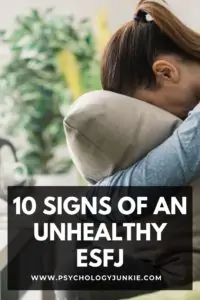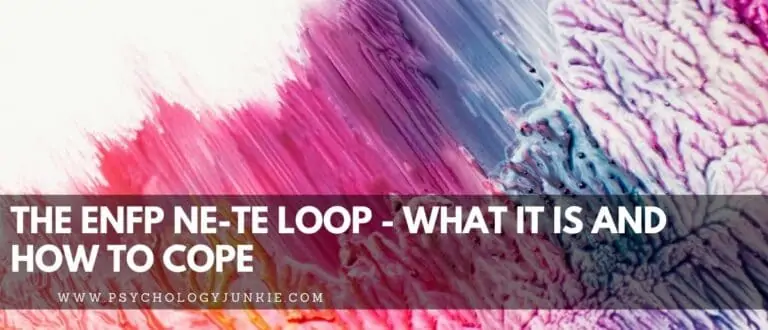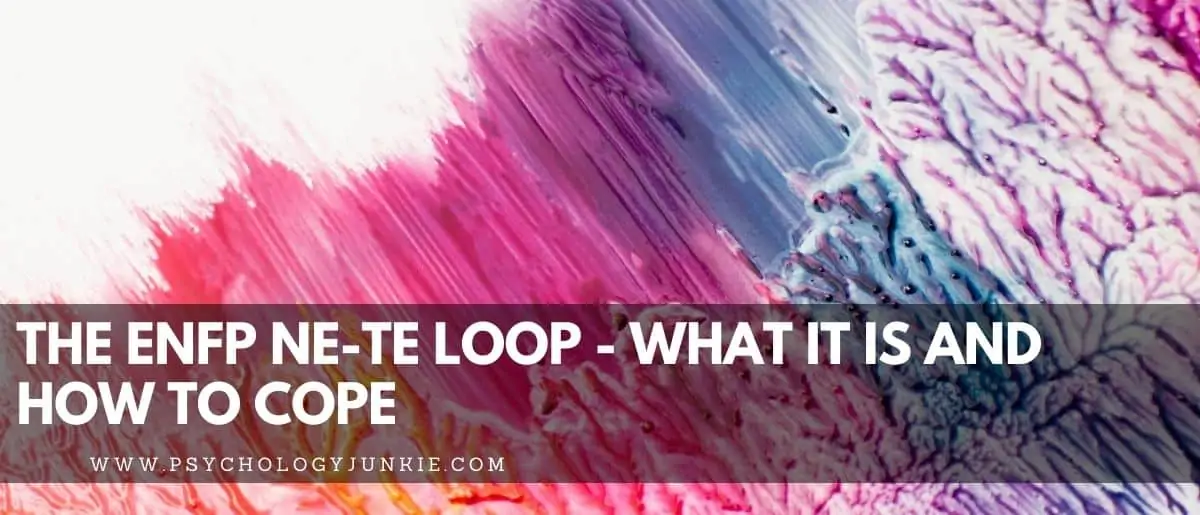10 Signs of an Unhealthy ESFJ
Down-to-earth and friendly, ESFJs have rightfully earned the nickname “The Defender” in the type community. Why this nickname? ESFJs are known for defending traditions, their communities, and the values they hold dear. These types are famously loyal, considerate, and helpful.
But what if you’re dealing with an unhealthy ESFJ?

Unhealthy ESFJs may seem very different from the ESFJs you’re used to reading about in type descriptions! Rather than being welcoming and pragmatic, they can be conniving, one-sided, or people-pleasing and impatient.
Table of contents
Estimated reading time: 7 minutes
Before You Begin, Read This:
Unhealthy ESFJs can show up in many different ways. Some are cliquey and bullying while others will bend over backward for everyone. Some are unhealthy for years at a time while others have unhealthy spurts that last mere minutes.
ESFJs are wonderful individuals who bring incredible skills to the world. Do not assume after reading this that all ESFJs will match these “unhealthy” traits.
Let’s take a look at ten signs that you might be dealing with an unhealthy ESFJ:
- They are cliquey
Certain unhealthy ESFJs feel suspicious of people outside of their known social circles. They come across as status-seeking and superior. They may seem friendly to people outside their group, but it often comes across as shallow and placating rather than genuine.
- They are Over-Sensitive to Criticism
Making a good impression is crucial to the ESFJ. Even the healthiest ESFJ tends to feel crestfallen when they are criticized, but unhealthy ESFJs simply cannot take it. Instead of taking the criticism as a constructive piece of advice that they can use or leave, they react with confused, emotionally-biased reactions. They will rationalize reasons that the criticizer is wrong or mean-spirited, and make logic fit their clouded reasoning.
- They Meddle and Create Drama
Unhealthy ESFJs may create drama or meddle just to create interesting emotional dynamics in their environment. Healthy ESFJs try to create harmonious, positive environments. Unhealthy ESFJs feed off of emotional intensity, and at a certain point don’t even care whether it’s good or bad as long as they are viewed on the favorable end of it. Thus they may create “Us vs. Them” scenarios, staying determined to stay on the “Us” side.
- They Are Co-Dependent
Many unhealthy ESFJs are so fixated on everyone else’s feelings that they lose control over their own. In their minds, they can only be happy if the people around them are happy. Thus, they are dependent on other people to set the “mood” for their internal world. They may also try to control all their relationships, fixing everything for everyone else, so that those others don’t endure any struggles and, in turn, create inner chaos for themselves.
- They Have Little Patience for Individual Needs
Healthy ESFJs are deeply in tune with the physical and emotional needs of other individuals. Unhealthy ESFJs are so fixated on the overall feelings of “the group” that if individual needs disrupt that, they become short-tempered and controlling. In effect, they convey to people that they need to push their individual feelings “under the rug” in order to serve the overall harmony of the group at large.
- They Jump to Conclusions
Certain ESFJs are so focused on forming judgments and conclusions that they don’t take enough time to reflect and process information adequately. As dominant judging types (E—J types are judging-dominant types), there is a natural desire to come to a decision or judgment. However, healthy ESFJs balance this need for judgment with time for reflection on the history, facts, and details of a situation. Unhealthy ESFJs don’t take the time to sink into the details and reflect, they quickly make snap-judgments and move on. This is due to a lack of maturity in their auxiliary function, Introverted Sensation (Si).
- They are “Martyrs”
ESFJs who stifle their own needs in favor of caretaking for others often develop “martyr” complexes. They serve and serve without ever lifting a finger for their own needs. They hope that people will see their efforts and try to return the favor, but because they never verbalize their needs or ask for help, others just don’t know what to do. In turn, this creates a martyr complex inside the ESFJ and they feel that nobody is truly there for them.
- They are Overbearing
ESFJs have a strong sense of responsibility for their loved ones. They feel it’s their job to make sure that everyone is taken care of and on the right track. Unfortunately, this need to help and protect can become overbearing, intrusive, and meddling. They may pry into the lives of their loved ones, be too intrusive, or become overprotective in an attempt to “fix” any bad situations that might come their way.
- They Are Social Chameleons to an Unhealthy Degree
ESFJs thrive when they have a supportive group of friends and confidantes in their lives. If they don’t find a group where their natural gifts are supported, they may desperately try to fit in, even relying on their less-preferred functions so as not to stand out. Their insecurity can lead to them never quite honing their strengths or refining their own natural abilities. They may struggle to find themselves and flip-flop back and forth between who they truly are and who they feel they need to be depending on who they’re with.
- They Have No Tolerance for Ambiguity
ESFJs like having a clear plan and sense of direction. They also want everyone to be on board with the plan. Procrastination, waiting-and-seeing, or being unclear can drive them crazy. This is especially true for unhealthy ESFJs, who simply don’t abide indecision at all. They may push people into situations before they are ready or force people to make an absolute decision before they’ve had time to look at all their options.
Tips for the ESFJ:
- Make time for yourself. Don’t get so wrapped up in taking care of others, or taking on others’ feelings, that you lose yourself. Rest. Exercise. Eat well. Engage in your own individual hobbies.
- Remember that you are not responsible for everyone else’s feelings. Every individual is responsible for their own feelings. Learn to differentiate what is your responsibility and what isn’t.
- Get to know yourself. Journal, shut off the phone or the TV, or even talk to a therapist. Don’t spend so much time with others that you aren’t getting enough time to discern your own values, tastes, and needs.
- Take time for reflection. Realize that others, particularly introverts, need time for reflection (more time than is necessary for you most of the time). Realize that when people retreat into their rooms or need space and time to consider before making a decision, that that is a healthy process.
- Realize that there is value to other perspectives. You are an ESFJ. This means that the Introverts, Intuitives, Thinkers, and Perceivers may seem confusing to you. They may seem to have their priorities “all wrong” to you. Realize that you need different things than they do. You look at, and notice, different criteria than they do. The things that fill up your energy levels may drain them, and vice versa. Take time to get to know people for who they really are, and respect the differences.
- Learn to set healthy boundaries. When you feel pulled to alter the emotional atmosphere around you, take a moment to check in with yourself. Are you taking on other people’s emotions? Are you truly responsible for those emotions? What are your core needs? How will you feel if you take a step back and say “No” right now? How will you feel in the long-run? Remind yourself that it is okay to take care of yourself and to say no. Remind yourself that the people who really matter actually do want you to take care of yourself and say no if you don’t want to do something.
Want More Information? More ESFJ Articles:
24 Signs That You’re an ESFJ, the Defender Personality Type
7 Things That ESFJs Experience as Children
10 Stress-Busting Tips for ESFJs














Can you guys post some articles on ESTJ and ENTJ. There wasn’t an article for every type..
Hi! I have written an article on the unhealthy ESTJ here: https://www.psychologyjunkie.com/2018/04/12/the-unhealthy-estj/
I haven’t gotten to the ENTJ yet, but hope to soon!
I think my dad is most likely to be an unhealthy ESFJ. Since I was born, he frequently displays the behaviors in point 7 and 9. When we were kids he will “entertain” us even when we never asked for it then he will complain to my mum behind my back that he needs to entertain us. He would agree to help us even when he doesn’t want to then he will express this resentment in passive-aggressive ways. My dad also displays behaviors listed in 1, 3, 4 (sometimes), 6 (sometimes) and 10. He would create “us” vs “them” drama in our family by telling my mum that I “abused” the dog, even when such a thing didn’t happen. He would also avoid conflict at all costs and withhold advice that would otherwise be useful to his own children, or he would “preach” values that he doesn’t follow himself. He will bend over backwards for other people but when it comes to his own family’s needs he can be very calculative. He blindly respects authority figures, while also looking down on people who are less sophisticated than popular politicians in my country
Any tips on how to reason with/defuse unhealthy ESFJs who have decided you are a thoroughly unacceptable human being for merely being yourself and has grouped everyone against you to antagonize you? I have had very little success against them in the past (basically, it’s only ended by me leaving or them and their groupies leaving) and would like advice on how to proceed if I encounter another that my clothing, hobbies, pimples, whatever sets off.
This is why the INTJs can never get along well with those ESFJs (and ISFJs)
I am unfortunately with one ..you are correct
Despite it being my opposite type, I have garnered an appreciation for mature ESFJs over time, considering with them being some of the older members in my family. Though admittedly, it’s easier to get along with middle aged or older ESFJs who have some level of developed Ne and Ti, where they wouldn’t necessarily be good at deep, abstract or intellectual conversations but they’re happy to listen or try – not to mention some of my experiences when going to the library where some ESFJ elder librarians are for some reason, and I find myself at a loss at getting along with those ESFJs closer to my age. Oddly enough, many of them have approached me over the years because I look like that “shy lonely person in the corner,” when I really just want to read a book alone sometimes, and sometimes, all you can do is try to run away whenever they try to say hi to you on the street.
The unhealthy estj I deal with, also seems oblivious to other people’s needs. It’s like, they just don’t understand that someone needs to eat everyday, or assumed they did, or feels that in general is not their responsibility. Be it animals. Family. Friends or people. & Often feel annoyed if they have to share any food. But will, then become passive aggressive about it later .. & even more neglectful to the person in that area.
Us vs them. Very true, they sense the emotions of the group. & If they feel someone is not liked, then they go ‘all out’ in making passive, or aggressive comments about the person, over exaggerating actions. Or going by what they ‘felt’ the actions meant at the time from the perceived emotion of the group.
Then, if the emotion of the group eventually shifts toward positive. But they don’t notice. Then they get stuck in a ‘negative loop’. Or if they realize the person in question is actually positive. & They incorrectly perceived the opinions of the group. Then they get caught in a rock & a hard place. Where everyone Did like them. & Esfp likes them. But because of the ‘ us vs etc ‘ created .. they’re now ostracized from the group. The esfp is now at a loss because they created a situation that did not exist. Because they incorrectly filtered ‘ group feelings ‘. To the point where it’s too late. & Now they’re stuck trying to repair, when they have done too much damage, from something they assessed incorrectly.. & at this point. It’s either, admit you were wrong & take blame ..but that is not something in their vocabulary.. or try to trudge along. hoping they would change, while the other person. They now like. slowly gets further out of grasp ..
Also, when arguing ‘ Everyone thinks this’ or ‘that’s why Everyone ( blank )’ it can often feel like you’re arguing with an army with them. When really. ‘everyone’ doesn’t think that .. & they’re actually isolating themselves verbally by saying that ..
any S types or ‘in the moment’ types they gather.. any ‘thinking ‘ types they reject ..or the conversation focuses on only things they know enough to talk about .. Otherwise they feel they’re ‘out of place’ and that the current group is making them Intentionally feel stupid, when really, they’re expressing that side of themselves because it doesn’t always get expressed when esfj tends to over dominate conversation. & if they get quiet in a group setting for too long, either because they ‘ felt ‘ a shift or couldn’t keep up ..Then expect them to lash out, usually with passive aggressive comments, until one of them snaps. Then they go into ‘what, I was just ..’ then go into gaslighting to make it seem they did nothing, while the group tries to pacify. All because they felt stupid /awkward /alone so they needed the chaos ..rather interrupt a good time than be lost in conversation for a little bit. Simultaneously have to be at the Center of the group.. & not at the same time , because center means it’s Obvious if something happens who’s at fault. But it also means being able to direct, change, flow for of the group .. so close , but without being too close..
Also , An unhealthy esfj would look at this & Think of ways to use this information. Not to make things better for them /those around them, but to manipulate the information & use it to not ‘ be seen ‘ . Even more ..